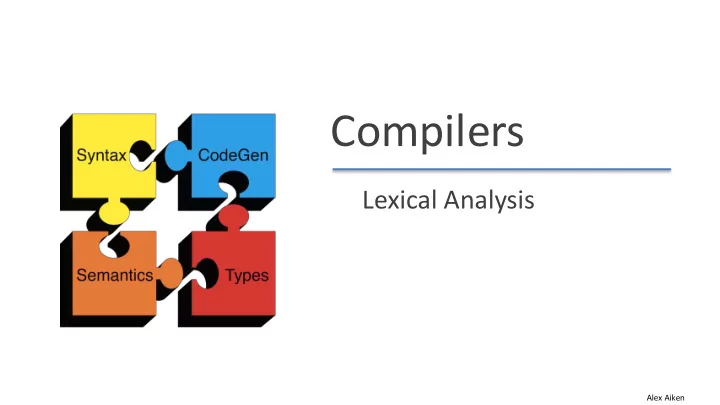

Compilers Lexical Analysis Alex Aiken
Lexical Analysis 1. Lexical Analysis 2. Parsing 3. Semantic Analysis 4. Optimization 5. Code Generation Alex Aiken
Lexical Analysis if (i == j) Z = 0; else Z = 1; \tif (i == j)\n\t\tz = 0;\n\telse\n\t\tz = 1; Alex Aiken
Lexical Analysis • Token Class (or Class) – In English: – In a programming language: Alex Aiken
Lexical Analysis • Token classes correspond to sets of strings. • Identifier: – strings of letters or digits, starting with a letter • Integer: – a non-empty string of digits • Keyword: – “else” or “if” or “begin” or … • Whitespace: – a non-empty sequence of blanks, newlines, and tabs Alex Aiken
Lexical Analysis • Classify program substrings according to role • Communicate tokens to the parser Alex Aiken
Lexical Analysis \tif (i == j)\n\t\tz = 0;\n\telse\n\t\tz = 1; Alex Aiken
Lexical Analysis For the code fragment below, choose the correct number of tokens in each class that appear in the code fragment x = 0;\n\twhile (x < 10) {\n\tx++;\n} W: Whitespace W = 9; K = 1; I = 3; N = 2; O = 9 K: Keyword I: Identifier W = 11; K = 4; I = 0; N = 2; O = 9 N: Number O: Other Tokens: W = 9; K = 4; I = 0; N = 3; O = 9 { } ( ) < ++ ; = W = 11; K = 1; I = 3; N = 3; O = 9
Lexical Analysis • An implementation must do two things: 1. Recognize substrings corresponding to tokens • The lexemes 2. Identify the token class of each lexeme Alex Aiken
Recommend
More recommend